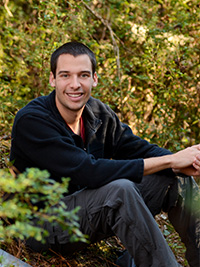Each year, The Graduate School honors graduate students in programs throughout our University for their powerful discoveries that contribute to a better future for people and communities in North Carolina. We're pleased to present 17 Graduate Education Advancement Board Impact Awards for 2016.
Doctoral and master's students, working in close collaboration with their faculty mentors, pursue promising new ideas. They then apply their new knowledge to improving human health, strengthening communities and creating greater understanding of our world's biggest challenges. That innovation is something to celebrate. We hope you enjoy reading about the inspiring discoveries of our 2016 GEAB Impact Award recipients.
View all of the 2016 Impact Award winners and their projects
Creating Better Oral Health Outcomes for Young Children
Jacqueline Burgette, Health Policy and Management
Improving Accessibility and Quality of Sprayfield Data
Elizabeth Christenson, Environmental Sciences and Engineering
Assessing HIV Transmission, Geographic Barriers to Early Diagnosis
Anna Cope, Epidemiology
Sharing Powerful Narratives of Military Experience
Gregory DeCandia, Dramatic Art
Assessing Potential Threats, Benefits for Oyster Reefs
Luke Dodd, Marine Sciences
Homeownership and Asset Building in the 'Great Recession'
Ahmed Rachid El-Khattabi, Economics

“The recent financial crisis has called into question whether homeownership provides the financial security that has long been associated with it. Rachid's research sheds light on this timely question and shows that, even during the crisis years, homeownership provided a financial cushion for low-income households.”
Examining the Implementation of Anti-Bullying Legislation
Will Hall, Social Work
Childhood Exposure to Antibiotic-Resistant Bacteria
Sarah Hatcher, Environmental Sciences and Engineering
Using 3-D Printing to Improve Medication Compliance
Ashley Johnson, Biomedical Engineering
Does Ozone Contribute to Diabetes?
Desinia Miller, Toxicology
Cellular 'Debris' Discovery May Lead to More Effective Lupus Treatment
Andrew Monteith, Biochemistry and Biophysics
Mother-Child Approach Uses Technology to Reduce Sugary Beverage Intake
Brooke Nezami, Health Behavior
Testing Muscle Vibration's Ability to Improve Knee Function
Derek Pamukoff, Human Movement Science
Using GPS, Laser Technology to Calculate Where Oyster Reefs Will Thrive
Justin Ridge, Marine Sciences
Neighborhoods: Do They Support Healthy Eating, Aging?
Pasquale Rummo, Nutrition

“Pasquale is drawing attention to critical barriers faced by low-income individuals, minority subpopulations, particularly Latinos, and older adults. His work will ultimately help find policy targets that could be used in policy-level efforts to reduce health disparities by income, race and ethnicity, and age.”
Invasive Shrubs and Their Influence on N.C. Forests
Dennis Tarasi, Environment and Ecology

“Dennis is providing comprehensive and compelling evidence as to the impacts of exotic plant species and the pattern of these impacts across the Carolina landscape. This is work that advances our conceptual framework regarding the impacts of invasive species and, in addition, helps inform managers as to where and how to focus their efforts to control invasive exotics.”
Identifying Risk Factors in Early Pregnancy to Decrease Preterm Births
Christine Tucker, Maternal and Child Health

“North Carolina is confronted with high rates of preterm birth (12 percent), higher than the national average. In a time of increasing mandates for efficiency and effectiveness of state dollars, Christine's work will help to address North Carolina's high rate of preterm birth by ensuring that patients with highest risk are prioritized for pregnancy care management.”